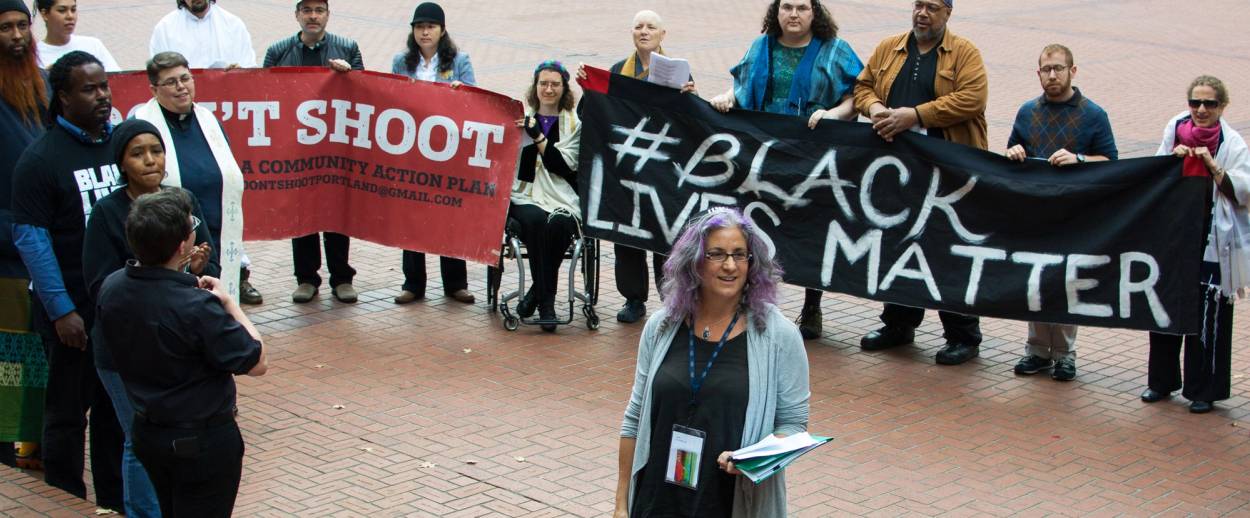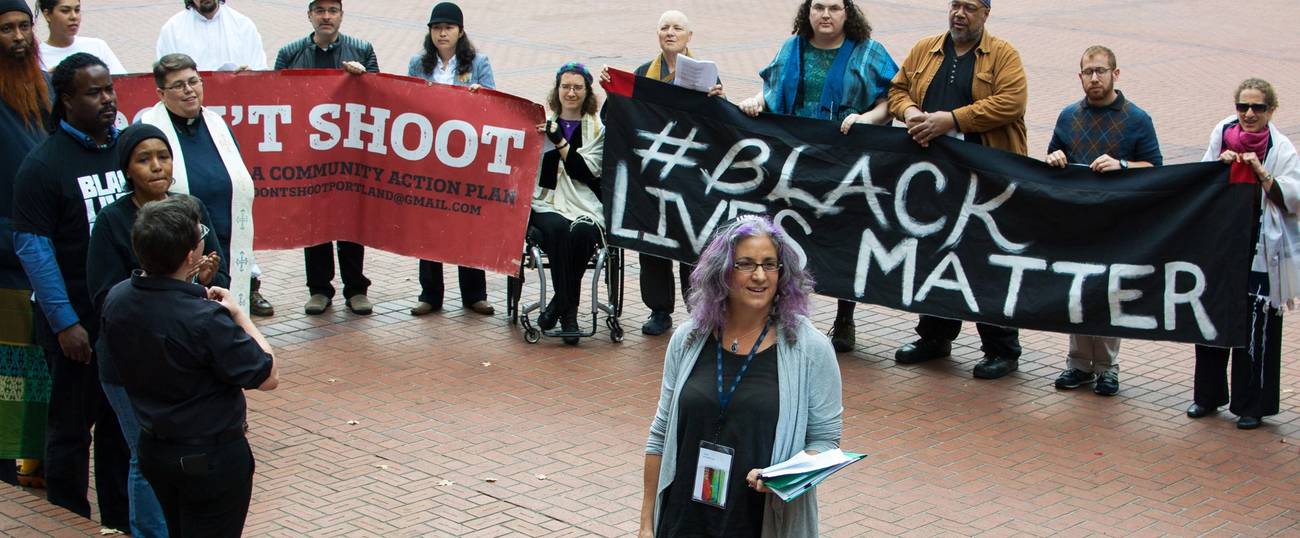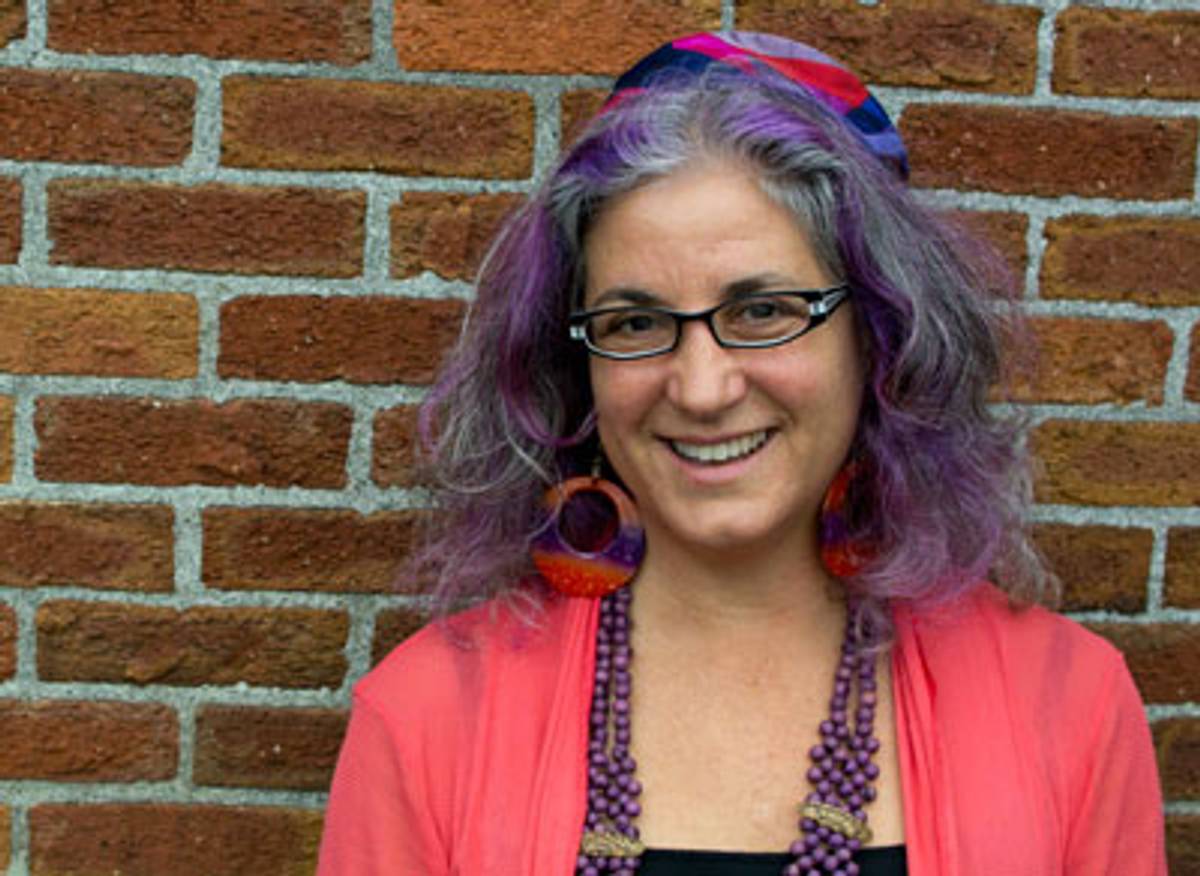The Spiritual Activist
Rabbi Debra Kolodny organizes queer clergy of different faiths around progressive issues, starting with Black Lives Matter




As Nehirim, a national organization for LGBT Jews, prepares to close its doors at the end of the year, its executive director, Rabbi Debra Kolodny, is turning her focus toward getting queer clergy involved in broader social justice issues.
“For decades, interfaith queer clergy have been saying we are intersectional, we are not just a one-issue movement,” said Kolodny, 55. Intersectionality is the concept that social identities around race, class, gender, and sexual orientation are interrelated, as are the forms of oppression against these social identities. “I’m frustrated that there is all this rhetoric on intersectionality, but almost no action on it.”
Now that same-sex marriage has been legalized, she said, queer faith leaders should turn the resources they gathered in that fight and point them in a new direction. “We have prophetic power, we are articulate, we are impassioned and inspirational, and we’re already organized,” said Kolodny. “What’s next? Can we focus on something that’s really critical, that’s calling out for more progressive faith voices?”
***
One major issue that has motivated Kolodny is the Black Lives Matter movement, a civil rights movement fighting against institutionalized racism in the United States. This fall, Kolodny joined with Muslim leader Dr. Ibrahim Abdurrahmani Farajajé and United Church of Christ Pastor Tara Wilkins to organize a Black Lives Matter queer clergy retreat in Portland, Oregon, where she is based.
“As an ally, I can’t think of another issue where my time and my energy and my resources need to be allocated,” said Kolodny.
More than two dozen Jewish, Muslim, Christian, and Buddhist queer clergy came together for four days in October to worship, learn, sing, and rally on behalf of Black Lives Matter. The retreat was genuinely interfaith, or as Farajajé described it, the retreat showcased “organic multi-religiosity.”
On the first evening, the group divided into three concentric circles. Those in the innermost circle held hands and chanted a Muslim prayer, those in the middle circle chanted a Jewish prayer, and the people on the outside chanted a Christian prayer. The group was not divided purely by religion; Muslims chanted Hebrew and Jews recited the Christian prayer. The triple circle held each other as the chant ended, and Kolodny whispered a prayer for people in pain.

There was a mutual respect among the clergy as they all gathered for Shabbat prayer and Torah study, Christian study and worship, and a Muslim prayer with dhikr and teaching. Half the participants were from Portland, with others coming from California, Illinois, Michigan, Texas, New Hampshire, and Washington, D.C. Three leaders from different Black Lives Matter organizations in Portland came to train the clergy in how to promote activism within their congregations and communities. The group staged an interfaith prayer vigil at the city’s Pioneer Square, praying, giving speeches, and chanting, “We can’t breathe.”
Throughout the weekend, Kolodny was constantly at work. “May I impose a framework?” she would say when a conversation strayed off-topic. She was mindful of making sure that everyone had time to speak, but she also injected humor and levity into her leadership. When someone pointed out they were ahead of schedule, she smiled and said, “We didn’t pray long enough—oh, shit.”
Quick to laugh but not afraid to cry, Kolodny was filled with passion and emotion as she maintained order during the retreat and allowed space for spirituality. While leading Shabbat prayer, Kolodny stood up and sang with her eyes closed, whirling in a circle, her silver and purple hair flying behind her.
***
It is fitting that Kolodny is interested in intersectionality because she herself cannot be pinned down and defined by one identity. She speaks in equal measure about her religion, her spirituality, her activism, and her bisexuality. “I thrive in complexity and multiplicity,” she told me, “which is why I particularly love being in interfaith settings.”
Kolodny’s peers describe her as passionate, vibrant, warm, funny, inclusive, a consummate organizer with a wild, infectious laugh. She is known to spontaneously erupt into prayer and dance; she met her wife, whom she married this past August, in an ecstatic dance class. (This is Kolodny’s second marriage—she divorced her husband of six years in 2001.)
Loraine Hutchins, a leading bisexual activist and co-author of the anthology Bi Any Other Name: Bisexual People Speak Out, was with Kolodny on the founding board of directors of Binet USA when it formed in the mid 1990s. “She’s somebody who really knows how to integrate humor and profound questions about the meaning of life into the same conversations,” Hutchins said of Kolodny, “and to also care a lot about people who don’t have power.”
Kolodny was raised in Far Rockaway, New York, and at the age of 12 decided she wanted to become a civil rights attorney. She went to the School of Industrial and Labor Relations at Cornell and University of Pennsylvania Law School.
She came out as a lesbian at age 20, and as bisexual a few years later. When Kolodny came out as bisexual, she said, her gay and lesbian friends responded with discomfort, disrespect, and hostility.
“One lesbian said to me, ‘There’s no such thing as bisexuality, you’ll figure out you’re a lesbian or you’ll kill yourself,’ ” recalled Kolodny. She and a bisexual male friend of hers started a bisexual group at their law school in order to feel safe in a shared space. “I’m an activist,” she said. “Creating what I feel is necessary becomes second nature to me.”
Bisexual people experience discrimination from both outside and within the greater LGBT community. ‘It’s not just a paler version of queerness,’ Kolodny explained.
After law school, Kolodny moved to Washington, D.C., and worked at a labor union, eventually moving into consulting for public and private sector companies. While in D.C., she became involved in local bisexual activism and then became one of the national coordinators for Binet USA.
Bisexual people experience discrimination from both outside and within the greater LGBT community. Kolodny said she’s faced accusations that bisexual people can’t be faithful, can’t be trusted, and are actually just closeted homosexuals. “It’s not just a paler version of queerness,” Kolodny explained. “There were confusions and there still are.”
Kolodny has led training around bisexual issues for LGBT organizations like the Human Rights Campaign and edited an anthology, Blessed Bi Spirit: Bisexual People of Faith. In September of this year Kolodny and other bisexual advocates attended a White House policy briefing to meet with the Obama Administration and address the struggles bisexual Americans face, including elevated mental, physical, and sexual health risks.
***
As Kolodny became increasingly religious, she catapulted into the leadership of the queer faith-based movement. When Kolodny’s activism fused with her spirituality, she became the intersectional faith leader she is known as today. However, she wasn’t always religious: She was raised in a family of secular Jews and was taught not to believe in God.
Her first spiritual experience happened in Israel during an interfaith trip funded by New York City’s Board of Education. Kolodny, then a high-school senior, wrote a prayer for her brother and put it in the Kotel. She said she felt the air around her transform and got the sensation she was being held. “Within moments I said to myself, ‘My parents are wrong. This is God,’ ” said Kolodny.
In college, Kolodny took Hebrew scripture classes and began diving into metaphysical readings in law school. In D.C., she prayed with Quakers for four years after walking into a meeting house and having a similar silent, spiritual moment that she experienced in Israel. In an attempt to connect more with Judaism, Kolodny took an adult bat mitzvah class at a havurah called Fabrangen in 1997. The first time she started studying the Torah, she had a mystical experience. “I felt like I fell into the text, like I had been talking about it and thinking about it and exploring it for 5,000 years,” said Kolodny. “In that moment, I said, I’m supposed to be a rabbi.”
However, Kolodny was resistant to going back to school and began a period of discernment, becoming the executive director of ALEPH: Alliance for Jewish Renewal before entering ALEPH’s rabbinical school in 2006.
Rabbi Lori Klein attended law school with Kolodny and served as the chair of ALEPH’s board during the end of Kolodny’s tenure. She also attended rabbinical school at ALEPH, overlapping briefly with Kolodny. Klein said because of Kolodny’s time at Fabrangen, she is very learned as a progressive liturgist: “She really knows a wide variety of chanting and how to lead Conservative-style services, but also Renewal, Reform, and Reconstructionist,” said Klein. She said ALEPH also requires their seminarians to do a “fair amount of work in Hasidic thought.”
Kolodny was ordained in January 2011 and took her first pulpit job at P’nai Or in Portland that August. In March 2013 she became the executive director of Nehirim.
“She is very well-rounded in her understanding of tradition and how we can live that tradition today in meaningful ways,” said Rivka Gevurtz, a former congregant and student of Kolodny’s at P’nai Or who now works with her at Nehirim. Gevurtz took an adult bat mitzvah class taught by Kolodny and said the class “went deep into halakhah, mysticism, and the different traditions of thought.” She said it was a way of growing her Judaism from an adult standpoint, not just coming back to something she could have done as a teen.
Farajajé, the Muslim leader who led the queer clergy retreat with Kolodny, said she is “invitational” when she speaks about Judaism: “Some people are really learned, they make you feel sort of stupid,” said Farajajé, who has known Kolodny since the early 1990s. He said she has a way of connecting words with songs and deeper meanings. “I just find it delightful, everything is always woven together with her.”
During her Shabbat service at the retreat, Kolodny spoke about how one of the Hebrew words for soul, neshama, is a feminine-gendered word while the word for body, guf, is a masculine-gendered word. “I’m perpetually tickled by the fact that all of us are both male and female in the grammar of the totality of our being,” said Kolodny.
Farajajé said, “I think Deb’s legacy is going to be these interconnections, these weavings together of struggles and of people striving for the oneness of all being, and for the healing of the earth, and our healing and transformation and that work. I think that’s going to be her gift.”
***
Nehirim closes in December, as local queer Jewish organizations grow in scope, and foundations shift their funding priorities to match the change in needs for LGBT Jews. “The offering of that container which created welcome and wholeness and safety and celebration is less necessary now,” said Kolodny. “We’re winding down because: mission accomplished.”
Kolodny is actively seeking a new organizational container for her work on activating queer clergy around social issues like Black Lives Matter and climate change. She’s also working on a local Portland project that she’s calling “The UnShul: Powerful Judaism Without an Edifice Complex.” The rabbi would like to provide 10-12 monthly offerings that have Jewish content and teachings to excite people who don’t want to attend a synagogue. The events she imagines include teaching Torah while leading a hike or a dance class, or drinking wine at a bar while speaking about Jewish ethics.
Spiritual punditry is another one of Kolodny’s passions, and she is hoping to work on a talk-show podcast for progressive faith leaders. “The culture is looking at how spirit can lead to action, how spirit can heal, how spirit can support the culture in moving toward justice,” she said.
It is a shame, Kolodny said, that there are thousands of progressive clergy whom people don’t hear from unless they go to their church, synagogue, or mosque. “It’s a renewable resource,” she said. “We get new ideas all of the time and we have the capacity to inspire and elevate the ethics and morality and the day-to-day civil culture. What we do hear a lot of is from right-wing conservatives and more and more from rabid atheists who are angry about God. Where are the beautiful, inspiring, progressive faith voices that can help lead this country toward goals that we all share? We all want more peace, love, health, and financial prosperity. Our agenda is not to use faith to divide; our agenda is to bring people together. It’s a unifying force.”
***
Like this article? Sign up for our Daily Digest to get Tablet Magazine’s new content in your inbox each morning.
Lorena O’Neil is a New Orleans-based culture reporter currently working on a book about LGBT clergy.